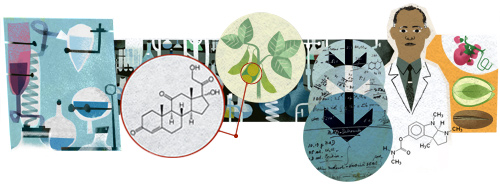Percy Julian's 115th Birthday

And there's notes.
Apr 11, 2014
If you are intrigued by today's doodle on the U.S. Google homepage, celebrating organic chemist, Dr. Percy Julian, I can provide no better recommendation than to watch the PBS documentary, Forgotten Genius, illustrating both his personal life and life's work.

It's no scientific revelation that it's the experiences from our everyday lives that inform our work, and in Dr. Julian's case, he used these experiences, overcoming tremendous challenges and racial barriers (and even a couple happy accidents) to become one of the most renowned and highly respected chemists in history.
Visually, I was presented with a familiar challenge: to create something fun and engaging for us non-science types (I confess to finding a way of skipping chemistry in high school), while still calling attention to Julian's key achievements in an appropriate (ie. correct and validated!) way. Before getting too far into the research, I sketched thumbnails of the common association – that of a chemist in a lab full of beakers and tubes:

As I read more about his work, I became fascinated with his process in the specific field of organic chemistry, and how he discovered ways to take rare and exotic components and synthesize them or discover alternate organic substances in place of more cost-prohibitive resources. Yep, that's a mouthful! So here are two key examples: His most well known triumph was the synthesis of the alkaloid, physostigmine, found in the african calabar bean, which led to a more readily available treatment of ailments such as glaucoma and Alzheimer's Disease. He also pioneered many uses from the soybean and soybean oil, developing a better process for obtaining cortisone to treat arthritis or to aid the body in the receiving of organ transplants.
With these amazing feats in mind, I began to play with the idea of the chemical potential in plants, going as far as to have beakers growing on soy plants, or leaves growing out of metal tubes.

However, I decided clever metaphors (or just really bad puns) wasn't the best way to go. But I did want to maintain a lighter graphical treatment, hopefully appealing to young future scientists. Combining that aesthetic with something resembling diagrams out of a school textbook was the direction I took, which felt appropriate considering the obstacles Julian personally overcame in receiving his own education.

Happy 115th birthday to the NOT Forgotten Genius, Dr. Percy Lavon Julian!




